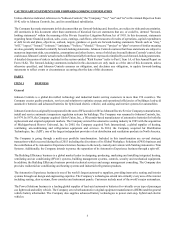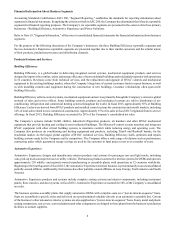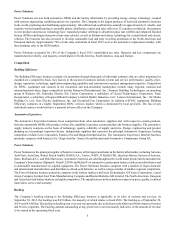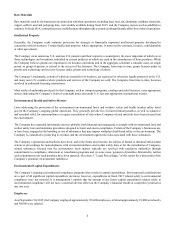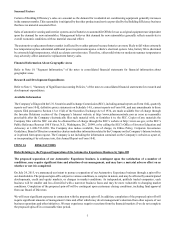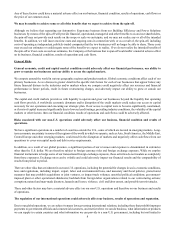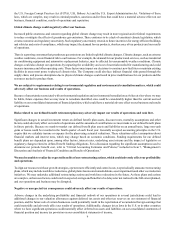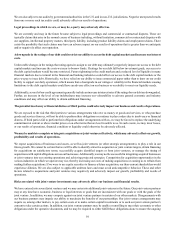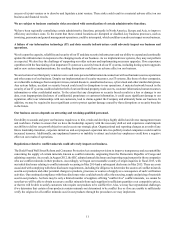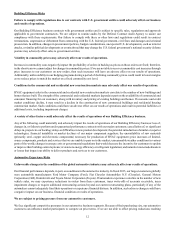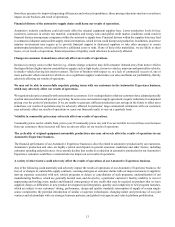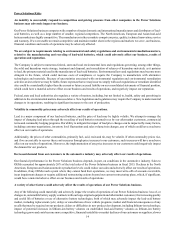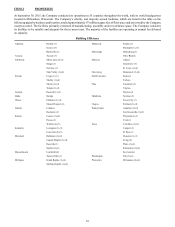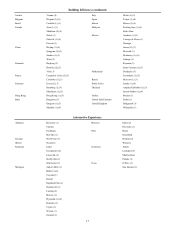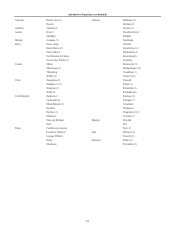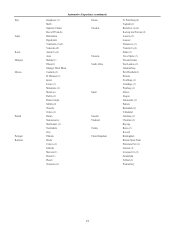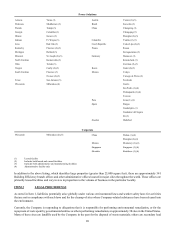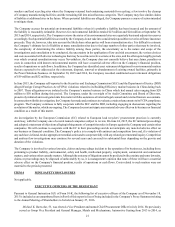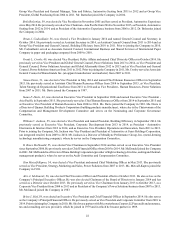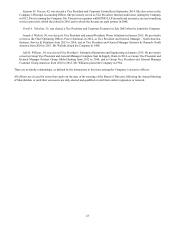Johnson Controls 2015 Annual Report Download - page 13
Download and view the complete annual report
Please find page 13 of the 2015 Johnson Controls annual report below. You can navigate through the pages in the report by either clicking on the pages listed below, or by using the keyword search tool below to find specific information within the annual report.13
from these pressures by improved operating efficiencies and reduced expenditures, those pricing reductions may have an adverse
impact on our business and result of operations.
Financial distress of the automotive supply chain could harm our results of operations.
Automotive industry conditions could adversely affect the original equipment supplier base. Lower production levels for key
customers, increases in certain raw material, commodity and energy costs and global credit market conditions could result in
financial distress among many companies within the automotive supply base. Financial distress within the supplier base may lead
to commercial disputes and possible supply chain interruptions, which in turn could disrupt our production. In addition, an adverse
industry environment may require us to provide financial support to distressed suppliers or take other measures to ensure
uninterrupted production, which could involve additional costs or risks. If any of these risks materialize, we are likely to incur
losses, or our results of operations, financial position or liquidity could otherwise be adversely affected.
Changes in consumer demand may adversely affect our results of operations.
Increases in energy costs or other factors (e.g., climate change concerns) may shift consumer demand away from motor vehicles
that typically have higher interior content that we supply, such as light trucks, crossover vehicles, minivans and sport utility vehicles,
to smaller vehicles having less interior content. The loss of business with respect to, or a lack of commercial success of, one or
more particular vehicle models for which we are a significant supplier could reduce our sales and harm our profitability, thereby
adversely affecting our results of operations.
We may not be able to successfully negotiate pricing terms with our customers in the Automotive Experience business,
which may adversely affect our results of operations.
We negotiate sales prices annually with our automotive customers. Cost-cutting initiatives that our customers have adopted generally
result in increased downward pressure on pricing. In some cases our customer supply agreements require reductions in component
pricing over the period of production. If we are unable to generate sufficient production cost savings in the future to offset price
reductions, our results of operations may be adversely affected. In particular, large commercial settlements with our customers
may adversely affect our results of operations or cause our financial results to vary on a quarterly basis.
Volatility in commodity prices may adversely affect our results of operations.
Commodity prices can be volatile from year to year. If commodity prices rise, and if we are not able to recover these cost increases
from our customers, these increases will have an adverse effect on our results of operations.
The cyclicality of original equipment automobile production rates may adversely affect the results of operations in our
Automotive Experience business.
The financial performance of our Automotive Experience business is directly related to automotive production by our customers.
Automotive production and sales are highly cyclical and depend on general economic conditions and other factors, including
consumer spending and preferences. An economic decline that results in a reduction in automotive production by our Automotive
Experience customers could have a material adverse impact on our results of operations.
A variety of other factors could adversely affect the results of operations of our Automotive Experience business.
Any of the following could materially and adversely impact the results of operations of our Automotive Experience business: the
loss of, or changes in, automobile supply contracts, sourcing strategies or customer claims with our major customers or suppliers;
start-up expenses associated with new vehicle programs or delays or cancellations of such programs; underutilization of our
manufacturing facilities, which are generally located near, and devoted to, a particular customer’s facility; inability to recover
engineering and tooling costs; market and financial consequences of any recalls that may be required on products that we have
supplied; delays or difficulties in new product development and integration; quantity and complexity of new program launches,
which are subject to our customers’ timing, performance, design and quality standards; interruption of supply of certain single-
source components; the potential introduction of similar or superior technologies; changing nature and prevalence of our joint
ventures and relationships with our strategic business partners; and global overcapacity and vehicle platform proliferation.


